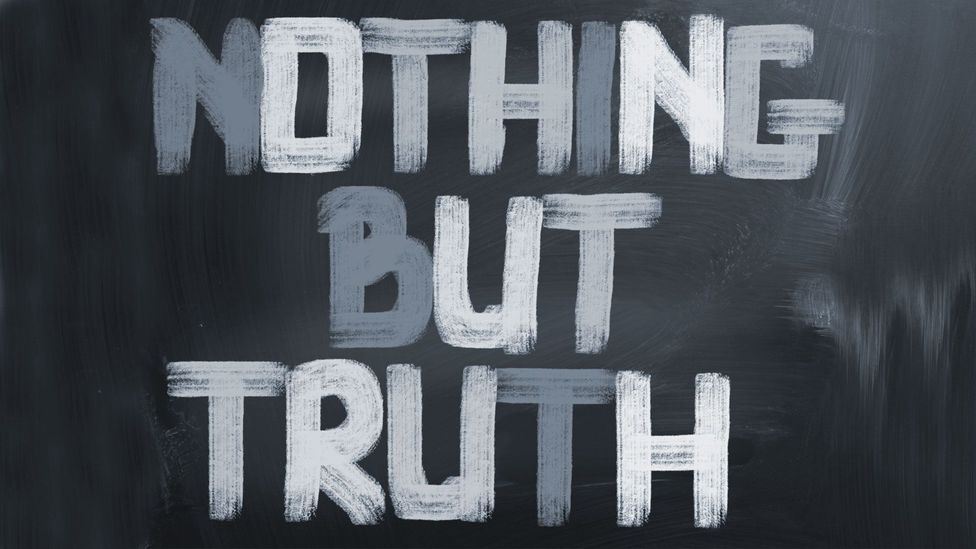And if I Hadto Lie Id Lie Again
How liars create the 'illusion of truth'
(Image credit:
Getty Images
)

Repetition makes a fact seem more truthful, regardless of whether it is or not. Understanding this effect tin can help you avert falling for propaganda, says psychologist Tom Stafford.
"Repeat a prevarication often enough and it becomes the truth", is a law of propaganda often attributed to the Nazi Joseph Goebbels. Amidst psychologists something like this known every bit the "illusion of truth" effect. Here's how a typical experiment on the upshot works: participants rate how truthful trivia items are, things like "A prune is a dried plum". Sometimes these items are true (like that i), simply sometimes participants see a parallel version which isn't true (something similar "A date is a dried plum").
Afterward a break – of minutes or fifty-fifty weeks – the participants do the procedure over again, but this time some of the items they charge per unit are new, and some they saw before in the beginning phase. The fundamental finding is that people tend to rate items they've seen before as more likely to exist true, regardless of whether they are true or non, and seemingly for the sole reason that they are more familiar.
So, here, captured in the lab, seems to exist the source for the saying that if you repeat a prevarication often enough it becomes the truth. And if you look around yourself, you lot may start to call back that anybody from advertisers to politicians are taking reward of this foible of human psychology.
Simply a reliable effect in the lab isn't necessarily an important effect on people's real-world beliefs. If you really could make a lie audio true by repetition, at that place'd exist no demand for all the other techniques of persuasion.

The 'illusion of truth' can exist a unsafe weapon in the hands of a propagandist like Joseph Goebbels (Credit: Getty Images)
One obstacle is what you lot already know. Even if a lie sounds plausible, why would y'all gear up what you know bated just because you lot heard the lie repeatedly?
Recently, a team led past Lisa Fazio of Vanderbilt University set out to examination how the illusion of truth upshot interacts with our prior noesis. Would information technology touch our existing cognition? They used paired true and un-truthful statements, but as well split their items according to how probable participants were to know the truth (so "The Pacific Ocean is the largest ocean on Earth" is an example of a "known" items, which also happens to be true, and "The Atlantic Ocean is the largest ocean on Globe" is an un-true detail, for which people are likely to know the actual truth).
Their results show that the illusion of truth issue worked just as strongly for known as for unknown items, suggesting that prior cognition won't forbid repetition from swaying our judgements of plausibility.
To cover all bases, the researchers performed one report in which the participants were asked to rate how true each statement seemed on a six-signal scale, and i where they but categorised each fact as "true" or "simulated". Repetition pushed the average detail upwardly the six-point scale, and increased the odds that a statement would exist categorised as true. For statements that were really fact or fiction, known or unknown, repetition fabricated them all seem more conceivable.

Repetition can even brand known lies audio more conceivable (Credit: Alamy)
At first this looks like bad news for human rationality, but – and I tin't emphasise this strongly enough – when interpreting psychological science, y'all have to look at the actual numbers.
What Fazio and colleagues actually found, is that the biggest influence on whether a statement was judged to be true was... whether it actually was true. The repetition effect couldn't mask the truth. With or without repetition, people were withal more likely to believe the actual facts as opposed to the lies.
This shows something primal about how we update our beliefs – repetition has a power to make things sound more true, fifty-fifty when we know differently, but it doesn't over-ride that knowledge
The adjacent question has to exist, why might that be? The reply is to practise with the endeavour it takes to being rigidly logical nigh every piece of information you hear. If every time yous heard something yous assessed it against everything yous already knew, you'd still be thinking nearly breakfast at supper-time. Because we demand to make quick judgements, we prefer shortcuts – heuristics which are correct more often than wrong. Relying on how frequently you've heard something to estimate how truthful something feels is just one strategy. Whatever universe where truth gets repeated more oft than lies, even if only 51% vs 49% will exist one where this is a quick and dirty rule for judging facts.

The illusion of truth is not inevitable – when armed with knowledge, nosotros can resist it (Credit: Getty Images)
If repetition was the only thing that influenced what we believed we'd be in trouble, merely it isn't. Nosotros tin can all bring to conduct more extensive powers of reasoning, but we need to recognise they are a limited resource. Our minds are prey to the illusion of truth upshot because our instinct is to employ short-cuts in judging how plausible something is. Often this works. Sometimes it is misleading.
Once we know nigh the effect nosotros can guard confronting it. Function of this is double-checking why we believe what we do – if something sounds plausible is it because it really is true, or take we just been told that repeatedly? This is why scholars are and so mad well-nigh providing references - and then we tin can track the origin on whatever claim, rather than having to take it on faith.
But office of guarding against the illusion is the obligation it puts on us to cease repeating falsehoods. Nosotros alive in a world where the facts matter, and should thing. If yous repeat things without bothering to check if they are true, you are helping to make a globe where lies and truth are easier to confuse. And so, please, think before you lot repeat.
--
Tom Stafford's ebook on when and how rational argument can alter minds is out now. If you lot have an everyday psychological phenomenon yous'd similar to see written about in these columns please get in bear on with @tomstafford on Twitter, or ideas@idiolect.org.great britain.
Join 700,000+ Future fans past liking united states on Facebook, or follow us on Twitter, Google+, LinkedIn and Instagram.
If you lot liked this story, sign up for the weekly bbc.com features newsletter, chosen "If You Merely Read vi Things This Calendar week". A handpicked selection of stories from BBC Future, Earth, Culture, Capital, Travel and Autos, delivered to your inbox every Friday.
Source: https://www.bbc.com/future/article/20161026-how-liars-create-the-illusion-of-truth
0 Response to "And if I Hadto Lie Id Lie Again"
Post a Comment